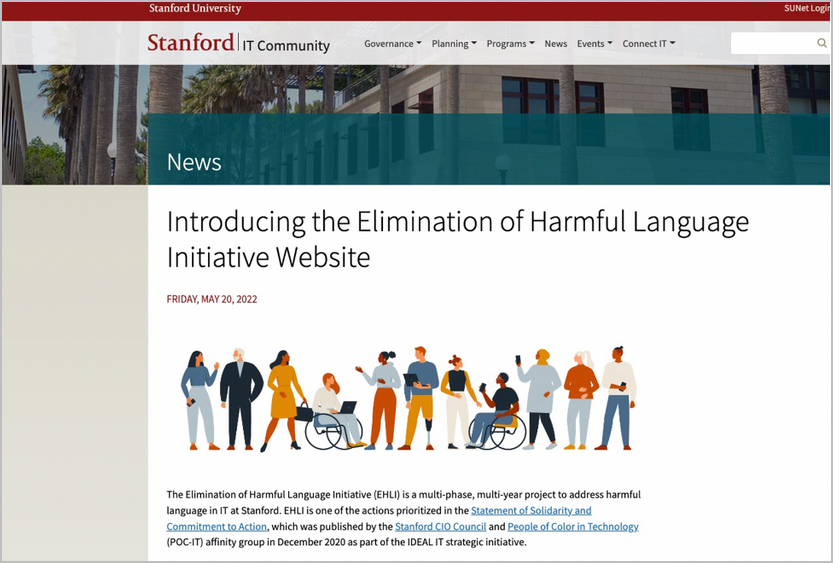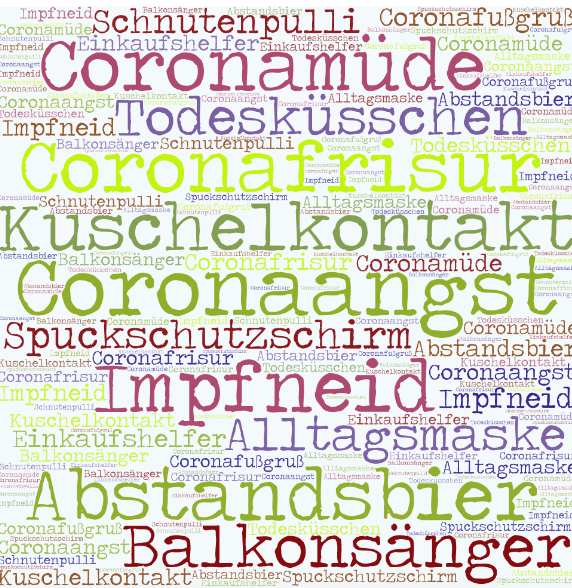Category Archives: Evolution of language

Stanford University’s initiative to replace racist and harmful terminology backfires
Further to widespread internal and external criticism and mockery, Stanford University has taken down their “Elimination of Harmful Language Initiative” (EHLI) website, created in May 2022. The EHLI was an effort co-sponsored by the Stanford CIO Council and the People of Color in Technology (POC-IT) affinity group. The primary motivation of the initiative was to …
“Stanford University’s initiative to replace racist and harmful terminology backfires”
Read More
Is visual media replacing text as our culture’s dominant form of expression? Pictures’ capacity to convey “a thousand words” is a palpable advantage
Meghan O’Gieblyn is an award-winning author and “spiritual advice columnist” at Wired. In a recent article she reassures us that visual media is not (yet) replacing text as our main form of expression but that do we need to be aware that our relationship to language is changing. On the one hand the artificial intelligence …
Read More
“Permacrisis”, “gaslighting”, “goblin mode” and “shortage” are some of the Words of the Year 2022
It’s that time of the year again when dictionaries announce their selection of top trending words. “Words of the Year” (WotY) are supported by usage statistics and tend to reflect societal attitudes and concerns. The tradition dates back to 1971, with the German Wort des Jahres, and the American Dialect Society’s WotY is the oldest English-language version …
““Permacrisis”, “gaslighting”, “goblin mode” and “shortage” are some of the Words of the Year 2022″
Read More
Research by MIT cognitive scientists sheds light on the features that make “legalese” so difficult to understand for lay people
A study by MIT scientists from the Department of Brain and Cognitive Sciences (BCS), published in September 2022 in Science Direct, has analysed thousands of legal documents using a text analysis tool that identifies repeating textual features. Their research has pinpointed several features that distinguish legal from nonlegal texts, including unnecessary jargon, passive sentence structures, …
Read More
Japanese bestselling author Haruki Murakami on writing in a foreign language … and why less is more
The Guardian has recently published an extract from the last work by Japanese bestselling author, translator and academic Haruki Murakami, Novelist as a vocation. In this extract Murakami writes about how he became a writer and how he “discovered” the unique and original style which characterises his literary work. Murakami had just turned 29 when …
Read More
New film celebrates Nüshu, China’s secret, female-only language from feudal times. Is it still relevant to women today?
by Pisana Ferrari – cApStAn Ambassador to the Global Village “Holding my brush to write this letter, two streams of tears flow/ Of the thousands hardships I have suffered nobody knows” … These words are translated from “Nüshu”, which literally means “the script of women”. Nüshu is a writing system created and used exclusively by …
Read More
Recent study reveals the extent to which accent bias is pervasive in British educational and work settings
A study on accent bias in Britain, titled “Speaking up”, has recently been published by the Sutton Trust, a UK charity whose work focuses on social mobility issues. The study, based on the experiences of sixth-formers, university students and professionals, reveals that 30% of university students, 29% of university applicants (mainly 17-18-year-olds), and 25% of …
Read More
President Macron’s new €185 M project aims to promote the French language as an international lingua franca
With 300 million speakers in 106 countries across 5 continents, French is the world’s fifth-most spoken language. For centuries French was a prestigious and élite language in which many of the world’s influential political, commercial, intellectual and artistic discussions were conducted. Over the last three decades times French has lost ground to English, which has gradually established itself …
Read More
The challenge of spelling in English and how a knowledge of language history can help make sense of it
It refreshing to be reminded, in a very enjoyable article by sociolinguist, academic and best-selling author Ingrid Piller, for Language on the Move, that the concept of “correct spelling” in English is much younger than the language. When the monks transcribed biblical texts in medieval times, they did not regard orthography as an issue or …
Read More
Argentina’s broadening ban on gender-neutral language reignites a debate that is reverberating across the world
After banning the use of gender-inclusive language in the military, Argentina announced it would extend the measure to Argentina’s public sector as a whole. Gender-neutral language is a highly controversial issue across the world and the debate has become part of a culture war in Latin America, says the author of this article in The …
Read More
German is an interesting case of how grammar can facilitate the creation of new words and influence the evolution of a language
by Pisana Ferrari – cApStAn Ambassador to the Global Village The coronavirus pandemic has led to an explosion of new words and phrases in many countries and cultures. We have written about this new lexicon, and how it is helping people to make sense of the changes in our lives, in a few articles for …
Read More
In defence of jargon – it might be annoying but it also has its uses, including for status compensation
by Pisana Ferrari – cApStAn Ambassador to the Global Village Jargon is, by definition, “exclusionary” and can get in the way of understanding crucial information, says Andre Spice, Professor of Organisational Behaviour at the University of London, writing for The Conversation. Research has shown that when used by doctors it can lead to patients not …
Read More